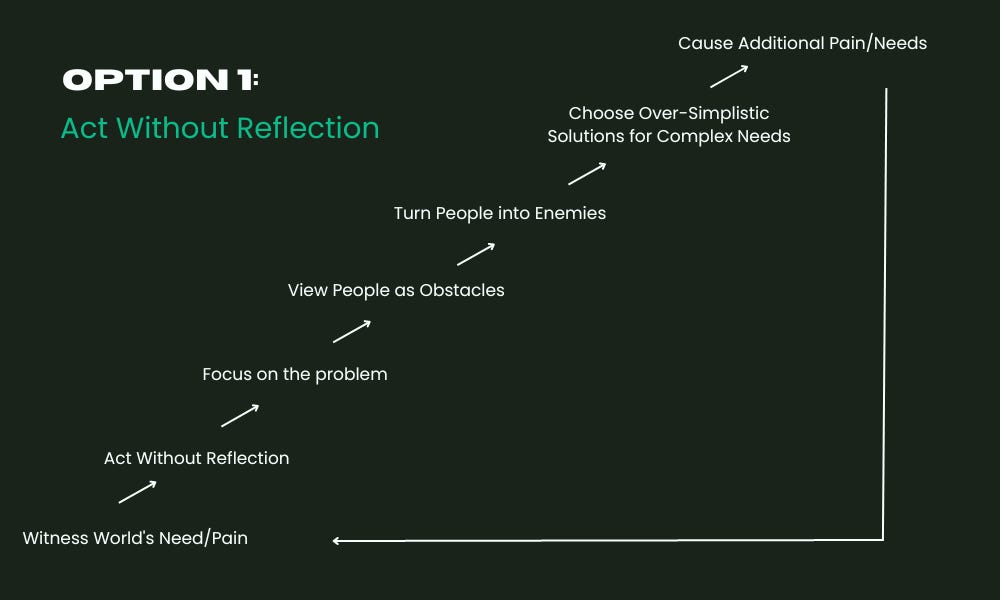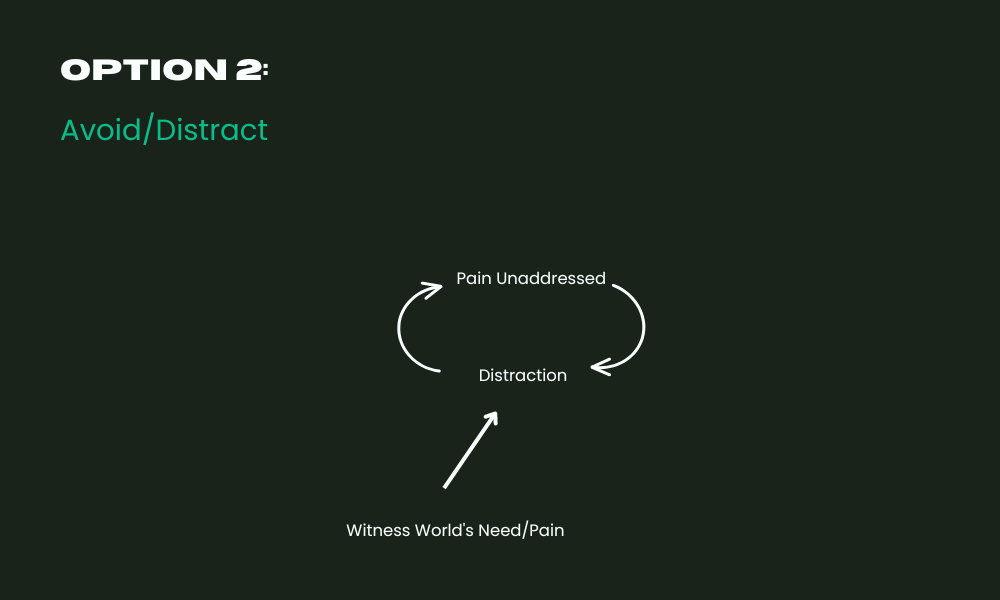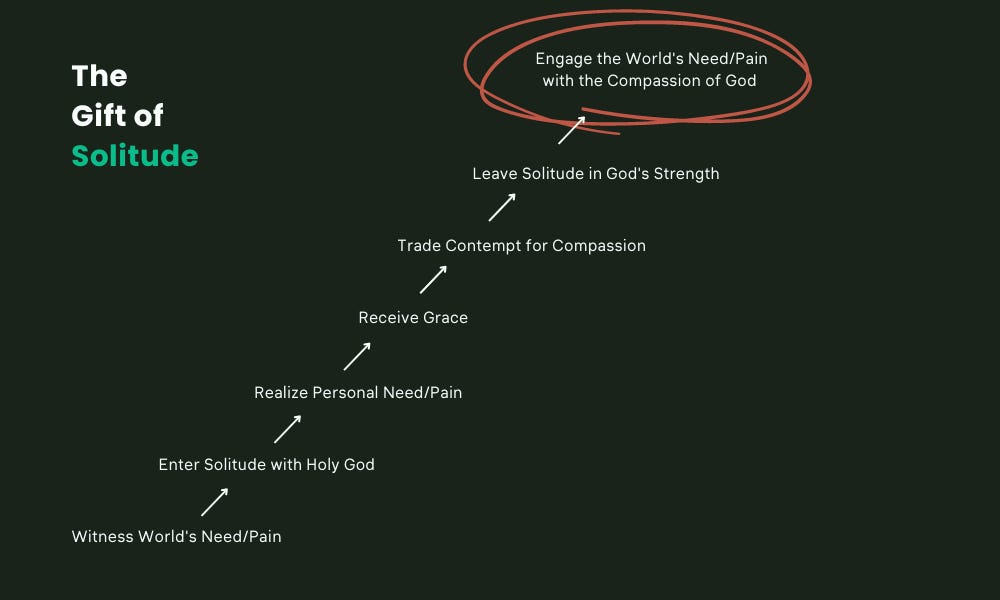In my last post, in which I discussed how the Holy Spirit works in tandem with our habits, I mentioned briefly at the end how the practice of solitude can lead to greater compassion. I realize that might’ve sounded a bit strange. I want to explain how solitude can produce compassion, but first, I’d like to touch on why compassion is the great need of the hour.
The Need for Compassion
Why is compassion so needed? My wife read my first draft of this blog post and kindly suggested that my introductory answer to this question was too heavy. Therefore, it’s been scrapped! Now in an attempt to avoid expounding on all the particular disturbances out there, I’ll simply say – it’s dark out there.
Daily, our phones ping rhythmically, notifying us of a new tragedy at home or far away. There’s no escaping from the world's brokenness; daily, it lays siege to the human soul.
I’ve seen two primary responses to this barrage.
One group of people immediately diagnoses the tragedies through the lens of their political persuasion. The temptation here is to view others rather than ourselves as the problem. As a result, we can demonize the very people who are experiencing the tragedies alongside ourselves. Once people are no longer people but obstacles, it’s only a matter of time before we’ve bulldozed several in our search for a solution to the pain. We might take action, but it’s done from a calloused heart. I call this “The Action without Reflection Option.”
The other option is what I would call “The Avoid/Distract Option.” In this option, rather than engaging the problem in the world, we avoid, retreat, and distract ourselves from the pain at hand. In this way, we might be able to maintain a soft heart in a hard world, but it’s soft because it shields itself from the world's actual needs. We distract ourselves, but the pain remains.
Singer-songwriter, John Griffin McKay, sang about this dynamic in his song “Wasting Time.” Read a few verses,
I heard there was another shooting in Texas
somebody filled with hatred and rage
but that didn’t fit for entertainment
so I kept scrolling down that page
Turn on the news and I can’t help but hear it
another boy went and took his own life
but in that moment there’s another distraction
“Look at my screen I got so many likes.”
It’s hard to care when it’s all so normal
But the world is spinning out of control
Try to ignore it by being social
But I’m uneasy down deep in my soul.
Those words are painful but truthfully spoken about “The Avoid/Distract Option.” Every time the pain emerges, we double down on distraction, so the cycle continues. The pain remains untouched, but our eyes are distracted.
Is there a way for us to maintain a soft heart of compassion while still meaningfully engaging the needs surrounding us?
The bible’s response would point to a word, “compassion.” Specifically, the compassion of Jesus. In Matthew 9:36, we read about the compassion of Jesus:
When he saw the crowds, he had compassion on them, because they were harassed and helpless, like sheep without a shepherd.
When Jesus sees the crowds, he has compassion. The word for compassion in Greek here is an interesting one. We translate it as “compassion,” but there isn’t an English equivalent strong enough to convey the depth of compassion described here. It’s a compassion that stirs you at a gut level. Like hearing your child scream for help, it compels you into action. It’s when your heart almost leaves your chest for the need in front of you. Jesus' level of compassion for all of us is beyond our comprehension, and he has that for us all.
However, notice that Jesus has compassion because the crowds are harassed and helpless, like sheep without a shepherd.
He sees our condition. Jesus has a heart soft enough to be moved to compassion but strong enough to see our state and still engage. Vulnerability and strength can work together. We need the heart of Jesus for today. But how do we get it?
We receive Jesus’ compassionate heart for the broken world by receiving his heart for our brokenness. Anything less than receiving his heart amounts to us taking empty actions and paltry imitations. His grace must be obtained so it may truly be given.
One of the best ways to witness to receive Christ’s heart for us daily is through the practice and gift of solitude.
The Gift of Solitude
If the world’s needs/pains concern us, then seeking solitude might sound counter-intuitive. However, if we know that the love of Christ is what the world's brokenness needs, it might not be so outlandish.
Do you need solitude to carry out the work of God? Well, Jesus practiced solitude.
Jesus begins his ministry by spending forty days in the desert (Matt. 4:1-11)
Early in the morning, Jesus seeks out a solitary place to pray (Mark 1:35)
Jesus spends the night on a mountainside in prayer (Luke 6:12)
Not only does Jesus seek solitude, but he instructs his disciples after their work to seek a solitary place to recover (Mark 6:30-32)
Could it be that Jesus is still beckoning his disciples to come away to be alone with him?
31 Then, because so many people were coming and going that they did not even have a chance to eat, he said to them, “Come with me by yourselves to a quiet place and get some rest.”
32 So they went away by themselves in a boat to a solitary place.
Mark 6:31-32
I think he is. In our age of noise, thoughtless opinion, and senseless violence, there’s a deep need to retreat into his presence. In his presence, he can transform our hearts, tend our wounds, and set us free to proclaim the Kingdom far and wide.
Contrary to popular belief, solitude isn’t just for introverts. If the solitude drives you further into isolation, then I’d wager you are not doing it right. Solitude ushers us into the heart of God, and his heart is for the broken - you will be sent out.
Why does solitude drive us into the heart of God?
The answer is the same reason so many people struggle to sleep at night. Many complain that their mind is spinning and often rehearse moments in the past that they carry shame over. We hate being alone because when we’re alone, our defenses are lowered, and the angst that plagues our interior lives begins to run free. Therefore, to avoid torment, we’d rather keep ourselves busy, scroll on our phones, or whatever creative way we like to distract ourselves.
Thomas Merton, the Trappist monk, wrote that confronting this sin and weakness within us is a great gift. Merton writes, “What is the use of knowing our weakness if we do not implore God to sustain us with His power? What is the value of recognizing our poverty if we never use it to entreat His mercy?”
Or how the Apostle Paul put it in 2 Corinthians: he rejoiced in the moment of weakness because then he was strong (2 Cor. 12:10)
The moment we’re alone, we’re assaulted by once-buried pain and sin. Either we flee to distraction, or we will be overrun in despair. Yet, there is a third option. We could run to the foot of the cross and receive the grace Christ has won for us. The beautiful thing is that whenever we encounter our great need and then encounter an even more merciful God, this leads to a transformed mind and heart of compassion. We find solidarity with everyone else who suffers and needs a savior.
Henri Nouwen explains,
“It is in solitude that this compassionate solidarity grows. In solitude we realize that nothing human is alien to us, that the roots of all conflict, war, injustice, cruelty, hatred, jealousy, and envy are deeply anchored in our own heart. In solitude our heart of stone can be turned into a heart of flesh, a rebellious heart into a contrite heart, and a closed heart into heart that can open itself to all suffering people in a gesture of solidarity.”
To put it another way, we begin to see the crowds with the compassion of Jesus. We begin to see the crowds the same way he does. From this position, we can start to engage the world’s pain with the compassion of God.
So my encouragement is this: don’t be overcome by the world. In the presence of pain, refuse to retreat to the numbing effects of social media and streaming television. In the moment of anxiety, resist the temptation to devise impulsive solutions. Instead, go with your deep sin and lack of direction to the savior who holds everything together. Receive grace, and venture into a broken world as an agent of his grace.
You must wrestle with God and seek his hand in broken situations.
Though the work is hard, your heart will remain soft.





Amen. In solitude we can only be who we truly are. There is no crowd to please or follow.